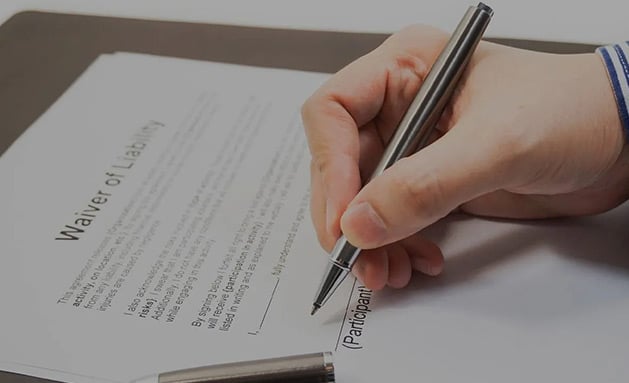The Ultimate Guide to Liability Waivers
Life is full of risks. When we participate in activities that involve risk, such as sports or recreation, we may be asked to sign a liability waiver. A liability waiver is a contract that releases the property owner or organizer from liability for any injuries that you may sustain while participating in the activity.
What is a Liability Waiver?
A liability waiver, also known as a release of liability, is a legal contract that one party enters into to give up their right to sue the other party for certain damages. Waivers are commonly used in connection with activities that involve inherent risks, such as:
- Skiing
- Horseback riding
- Rock climbing
- Hunting
- Visiting an amusement park
- Using a gym
- Contact sports
- Parachuting or skydiving
- Hitting golf balls at a driving range
- Handling or using toxic chemicals
- Being in a construction zone
Are Liability Waivers Enforceable?
The enforceability of a liability waiver depends on a number of factors, including the state in which it is signed and the specific terms of the waiver. In general, liability waivers are enforceable in Texas as long as they meet the requirements of fair notice. This means that the waiver must be:
- Clear and unambiguous
- Conspicuous
To be clear and unambiguous, the waiver must specifically state that it is a release of liability and that it is waiving the right to sue for certain damages. The waiver should also be specific about the types of activities and injuries that are covered by the release.
To be conspicuous, the waiver must be easy to find and read. It should not be buried in the fine print or in small, difficult-to-read text.
Unresolved Liability Waiver Issues
There are a few liability waiver issues that are still unresolved in Texas. One issue is whether a liability waiver can waive liability for gross negligence. Gross negligence is a higher standard of liability than simple negligence. It is defined as a reckless or intentional act that is likely to cause harm.
Another unresolved issue is whether a liability waiver signed by a parent on behalf of a minor child is enforceable. In general, parents can sign contracts on behalf of their children, but there are some exceptions. In the case of liability waivers, it is important to consult with an attorney to determine whether the waiver is enforceable.
Don’t Give Up Without a Fight
If you have been injured in an activity that involved a liability waiver, you should not give up without a fight. The law regarding liability waivers is complex and nuanced. There may be a detail in the waiver that makes it unenforceable.
The best way to protect your rights is to speak with an experienced personal injury attorney. An attorney can review the waiver and advise you on your legal options.
Contact Jim Adler & Associates
Jim Adler & Associates is a leading personal injury law firm in Texas. We have a long track record of success in helping clients who have been injured in accidents. If you have been injured in an activity that involved a liability waiver, we may be able to help you fight for the compensation you deserve.
Call 1-800-505-1414 or contact us online for a FREE consultation. We will review your case and discuss your legal options.





